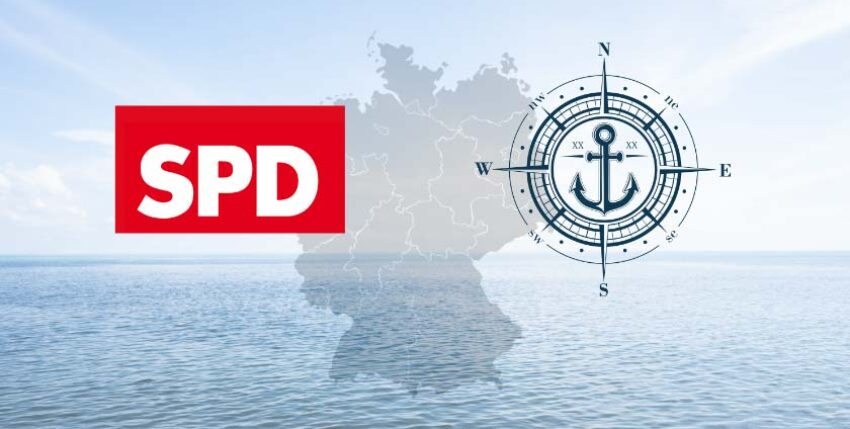How sensitive are our parties to maritime issues? This autumn, Germany will elect its 20th Bundestag and it has become a tradition for us to look at the parties' election manifestos and their maritime content! We started the series with the Election programme of the Free Democrats (FDP)In this article, we look at the Social Democrats' (SPD) programme for the coming legislative period. This is followed by the position papers of the Greens and the Christian Democrats (CDU/CSU). Wahl-O-Mat under the maritime magnifying glass.
At this point, we are not making a recommendation on the part of the editorial team, nor do we wish to pass judgement on the quality of the content. Instead, we would like to provide our readers with an initial overview: Is there a maritime awareness in the positioning of the respective party and how is it anchored? In this way, we want to encourage further debate and discussion. The programmes are scanned for maritime content, and we also look for the following terms (and their variations): Navy, Bundeswehr, shipyard, ship, maritime, offshore, harbour, trade, logistics, waterways, sea routes, water, sea, ocean, Baltic Sea, North Sea, Atlantic, Mediterranean, Indian Ocean and Pacific. As always, the parties themselves are responsible for the content and readability of their programmes!
Alongside the Christian Democrats, the Social Democrats have the most experience in leading the German state and its ministries: From 2005 to 2021, they were represented in three out of four governments as coalition partners of the Christian Democrats and held the leadership over a wide variety of departments, including Finance, Foreign Affairs, Justice, Economy, Transport, Health and Economic Cooperation and Development. From the 66 pages Election programme of the Social Democrats for the 2021 federal elections
Excerpt from the content of the SPD party programme:
Energy
We will support key industries on their path to climate neutrality and develop and promote specific transformation goals. We will make Germany the lead market for hydrogen technologies by 2030 - for the climate-neutral production of steel, for low-CO2 cars and lorries and for shipping and aviation.
Mobility
We want Deutsche Bahn AG to concentrate on its core business of transporting passengers and goods by rail and to focus on goals that are in the public interest. We want to expand and modernise rail freight transport. We will invest in the renewal and digitalisation of locomotives and wagons. We will reduce the cost disadvantages of rail compared to road in parallel with the expansion of capacity in rail freight transport. We will make greater use of the potential of our waterways to shift more freight transport from lorries to environmentally friendly inland waterways.
We will introduce a speed limit of 130 km/h on federal motorways. This will protect the environment and significantly reduce the number of accidents. We will also drive forward research, development and pilot projects to ensure that ships, aeroplanes and lorries no longer emit climate-damaging CO2. We are combining this with projects to establish an environmentally friendly hydrogen economy.
Nature
We want to preserve our natural habitat. To do this, we need to get out of the throwaway society. The future belongs to the circular economy. Plastic pollution in the oceans is particularly alarming. We need to stem the rising tide of plastic. We can only do this if we avoid and eliminate unnecessary plastic. Where single-use plastic is unavoidable, we will demand environmentally friendly and recyclable solutions. As much plastic as possible must be recycled and reused. We want to hold manufacturers even more accountable. Products must be designed in such a way that they can be reused, recycled and also repaired.
German Armed Forces
We consistently combat right-wing extremism in security agencies and the Bundeswehr. We counteract the emergence of racist thought patterns in everyday police work by enabling more supervision, further and advanced training and good working conditions. We support the establishment of specialised public prosecutor's offices to prosecute anti-Semitism and racism.
The Bundeswehr makes a responsible contribution to securing peace and defence. We stand for the primacy of politics and for the model of Innere Führung of soldiers as citizens in uniform. For us, it is clear that we can only fulfil our tasks as a reliable partner in Europe and NATO with a well-equipped and modern Bundeswehr.
Our soldiers can rely on us. We have therefore increased investment in the defence budget after many years of repeated rounds of austerity. Our soldiers deserve the best possible equipment and the highest level of training. Equipment instead of rearmament - committed to this principle, we have driven forward key procurement projects for the Bundeswehr and are continuously working to improve personal equipment and social security. At the same time, we will continue to increase the attractiveness of serving in the Bundeswehr. We stand for the best possible protection for our soldiers. This also includes the use of drones. The decision as to whether these should also be armed can only be made responsibly after a comprehensive political and social debate and careful assessment of all aspects.
Trade
The agreement between the EU and MERCOSUR is an important project to strengthen economic and political relations between Europe and Latin America. However, we will not agree to an agreement without strengthening environmental, human rights and social standards through additional binding and sanctionable review, implementation and enforcement mechanisms.
Our trade policy will support the socio-ecological transformation. To this end, trade in sustainable goods will be particularly promoted. Trade policy measures on a value-oriented basis always have the interests of our partners in mind, especially those of less developed countries. We will therefore also promote small-scale and agro-ecological agriculture in particular. In order to make trade policy more democratic, we will extend the European Parliament's control and decision-making rights and involve trade union and civil society representatives in negotiation processes more effectively than before.
International
We are committed to ensuring that Europe plays a pioneering role in international crisis prevention, peace and democracy promotion and the protection of human rights. We will strengthen Europe's responsibility in development cooperation and humanitarian aid by increasing EU funding.
More autonomy requires a greater ability to act. The introduction of majority decisions in foreign policy - instead of the current unanimity principle - is fundamental to this. The office of the EU High Representative for Foreign Affairs and Security Policy should also be developed into an EU foreign minister in the long term. We want a common approach to our global development cooperation and therefore want to join forces in Europe.
A united Europe contributes to the revitalisation of a functioning and cooperative multilateralism. We rely on international networks of trust, such as the Alliance for Multilateralism, which has already provided important impetus for cooperation.
NATO is and remains a cornerstone of the transatlantic partnership and indispensable for Europe's security. At the same time, the EU must become more independent in terms of security and defence policy. We will expand European cooperation. Our goal remains a European army as part of Europe as a force for peace. By pooling European armaments cooperation, we will utilise synergies and save unnecessary additional expenditure. Europe must be sovereign in developing new arms control and disarmament initiatives for the European continent in order to be able to react early to the risks of new technologies and dangerous developments in the cyber area or in space.
Europe's neighbourhood in both the south and the east is characterised by crises and the growing influence of other states. The EU must tackle these challenges with a conceptually realigned European neighbourhood policy. We will integrate the countries of the Western Balkans. We want to significantly expand the partnership between Europe and Africa politically and economically and raise it to a new level of cooperation.
We are approaching the new US administration, which is once again becoming more involved in international cooperation. We need nothing less than a fresh start in transatlantic relations. We will fundamentally strengthen the partnership between Europe and the US, which is based on shared and democratic values, and intensify cooperation on issues such as climate protection, global health policy, trade, disarmament and security issues.
It is in Germany's and Europe's interest to achieve joint progress with Russia on issues of common security, disarmament and arms control, as well as on climate, sustainability, energy and the fight against pandemics. However, we also recognise that Europe's relations with Russia are subject to repeated setbacks.
China's growing importance in the world means that a global response to the economic, ecological, social and political challenges of our time is hardly conceivable without Beijing. Conflicts of interest and values with China are increasing. Europe must maintain a united, constructive and critical dialogue with China on cooperation and competition. We condemn the serious human rights violations against minorities, especially Uyghur Muslims. The internationally recognised principle of "one country, two systems" must be upheld for Hong Kong. We view the growing pressure on Taiwan with great concern.
Note: The following search terms did not return any hits in the programme: Navy, sea routes, offshore, shipyard, maritime, ocean, logistics, sea routes, Baltic Sea, North Sea, Atlantic, Mediterranean, Indian Ocean and Pacific.








